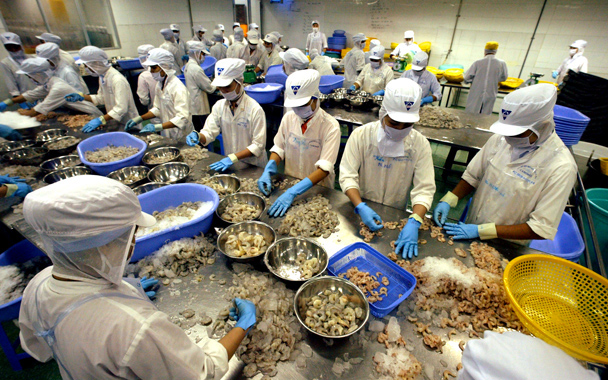Down on the (Shrimp) Farm
With environmental destruction, residual pesticides and antibiotics, and pollution of the water, I didn’t really need another reason to avoid eating imported farmed shrimp.
But I just got several: rape, torture, beatings, forced labor, child labor, human trafficking. That’s a short list of the human rights violations inflicted upon workers in the shrimp aquaculture industry in Bangladesh and Thailand.
The abuses are “widespread” and “prevalent,” according to a report entitled “The True Cost of Shrimp,” released this week by Washington, D. C.,–based Solidarity Center, an affiliate of the AFL-CIO. The paper compares conditions in shrimp processing facilities to those in the Asian garment industry two decades ago.
Local officials often turn a blind eye to abuses, and when they do act, punishment for the guilty is light. At one Thai plant, according to the report, workers (mostly Burmese migrants) who angered the boss “were often ‘put to shame’ in front of others by having their hair cut or shaved in patches. Women and girls were stripped naked and publicly beaten as a form of discipline.” The employer was charged, paid a fine of only $2,100, and went back to work.
Largely because of low prices, shrimp has become the most popular seafood in the United States. More than 80 percent of the shrimp we eat is imported, and Thailand alone accounts for a full third of that total. Those plastic bags of frozen shrimp may be cheap for us—but desperate people in Asia are paying dearly.
Total Recall
You’ve no doubt heard about the massive recall in February of beef from the Hallmark/Westland plant—the nation’s largest recall ever.
But unless you eschew beef, you have no way of knowing whether you grilled and ate a portion of the tainted meat, or whether your kids consumed it at their school cafeteria. There is no way for consumers to tell where recalled products are served or sold, and the United States Department of Agriculture (USDA) refuses to divulge that information.
Now there’s a chance that this might change. Earlier this month, Congresswoman Rosa DeLauro (D. Conn.) introduced The Food Safety Recall Information Act, a bill that would force the USDA to tell the public which stores and schools received recalled meat and vegetables. Food and Water Watch, a conservation and consumer advocacy group, has provided a handy link should you want to email your representative about your feelings on this bill.
Would You Pay $20,100 for a Half-Eaten Waffle?
Someone did earlier this week. But this wasn’t just any waffle. It came on a cheap china plate with a partially consumed sausage, leftovers from the conspicuously lowbrow breakfast that Barack Obama ate at the Glider Diner in Scranton, just before the Pennsylvania primaries.
The restaurant’s owner gave the unfinished meal to a regular, who promptly put it up on eBay, claiming that funds raised would be donated to the Clinton campaign.
Now that’s what I call politics of the plate.


